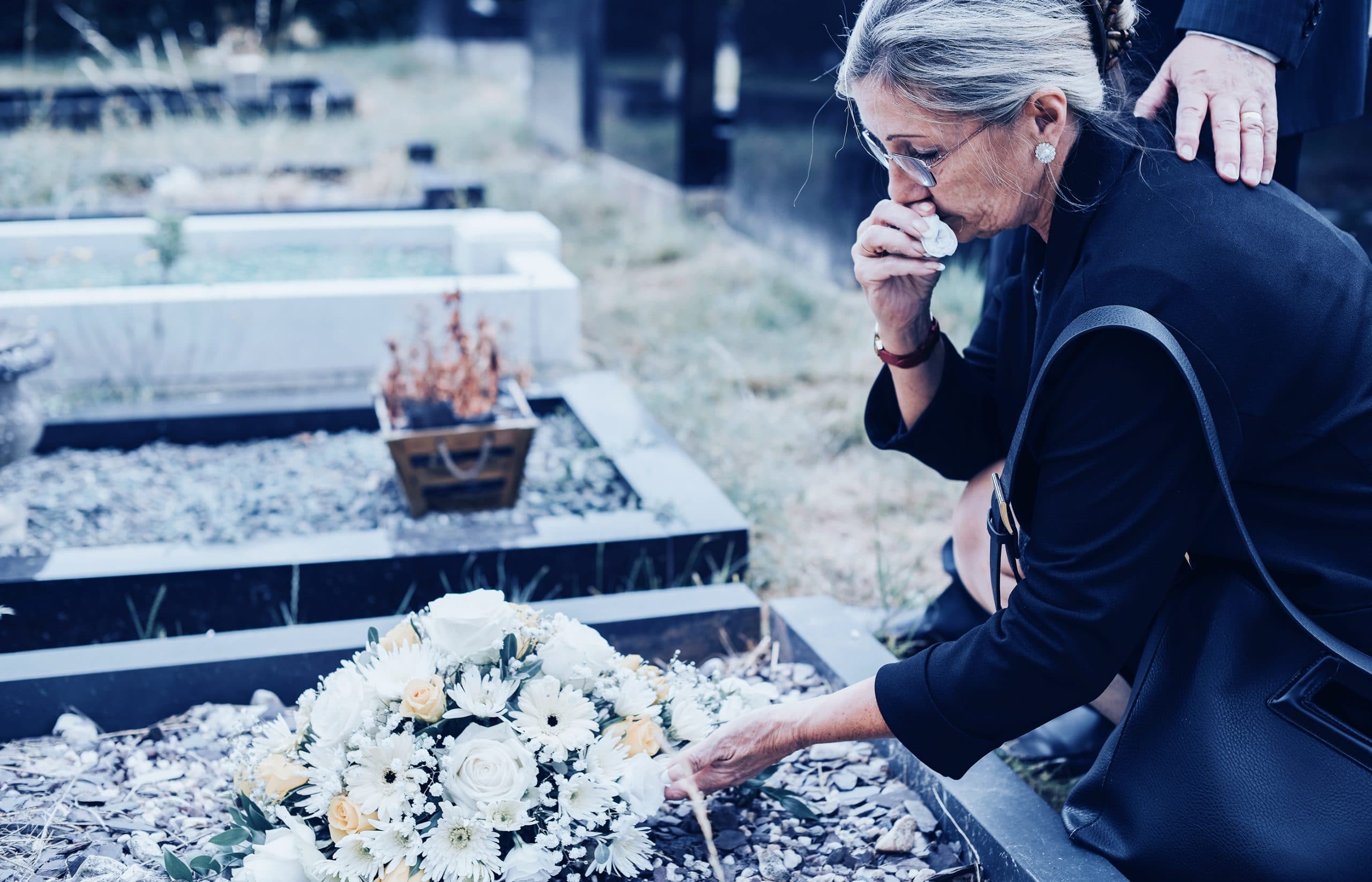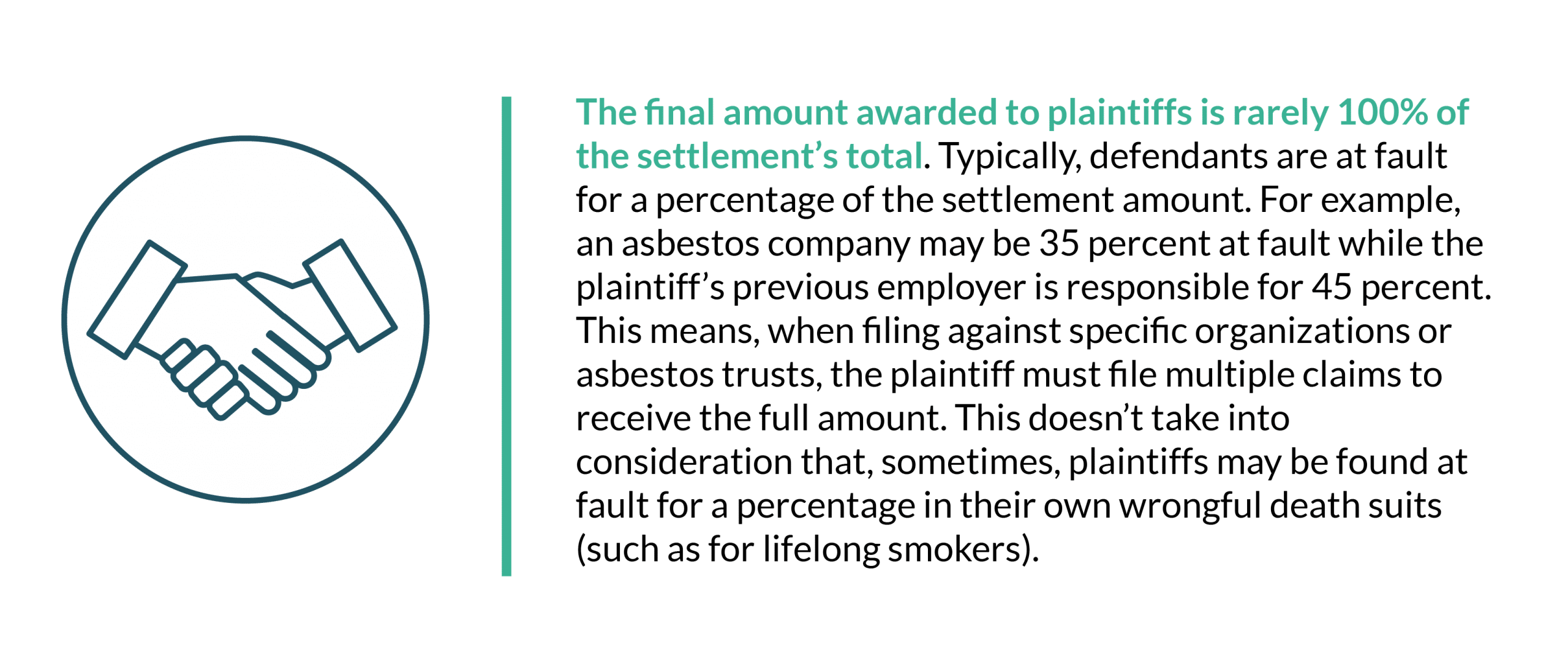Wrongful Death Lawsuit
A wrongful death lawsuit is a legal action for the early death of an individual from lung cancer that must be filed within the state’s statute of limitations.

What Is a Wrongful Death Lawsuit?
A wrongful death claim and lawsuit are legal actions taken for the unnecessary, early death of an individual from lung cancer caused by interaction with a person, product, or organization. Typically, in wrongful death lawsuits where the cause of death was lung cancer or a related illness, a product is liable for damages sustained. Consequently, companies are the entities typically held responsible for negligence in these lawsuits. Generally, plaintiffs seek monetary compensation for financial and emotional repercussions stemming from their loss.
When a loved one wrongfully dies due to asbestos negligence, it can feel overwhelming and unfair. By holding these entities and companies accountable, families can seek financial compensation not just for the financial loss but also for the emotional impact caused by this unnecessary tragedy. Continue reading to find out more about Lung Cancer wrongful death claims and how you can take back your rights and we can help you fight for justice.
Filing a Wrongful Death Claim in Civil Court
In order to file a legal action claim in civil court, individuals must meet the state-specified criteria of a wrongful death claim. These criteria may vary from state-to-state, but commonly include:
- The death of the individual stated in the claim (if a person was gravely injured but is still alive, a wrongful death claim will be invalid).
- Evidence of the defendant’s negligence that caused the death.
- Negative effects experienced by the plaintiff were caused directly by the death.
- The legal rights of the plaintiff to seek recuperation from the defendant.
Who Can File a Cancer Death Claim?
While it’s difficult to think about finances after losing someone, legal compensation helps cover costs like medical bills, funeral expenses, and loss of income. In most states, immediate family members such as spouses, children, and parents are eligible to file a wrongful death claim. In some cases, dependents or financially reliant individuals, like stepchildren or grandparents, may also be eligible. If you’re unsure whether you can file, consulting a wrongful death attorney can clarify your rights.
Today, each state has designated which family members are legally able to make wrongful death claims. In most cases, the individuals who can file a claim include:
- Immediate family (father, mother, sister, brother)
- Spouse
- Children (including biological, adopted, and stepchildren)
- Some relatives in certain cases, such as grandparents
- People dependent (especially financially) on the deceased
For more information, fill out a free case evaluation form today.
How Much Is the Average Wrongful Death Lawsuit Settlement?
Because the law cannot set a price on years of life, and because each case of wrongful death is different, there are no predetermined rates for wrongful death lawsuit settlements or rulings. Subsequently, there are no “typical” settlement amounts. Additionally, there are a number of factors affecting each claim (such as years of harm, the entity responsible, and even the circuit court presiding over the lawsuit).
Online “settlement calculators” fail to accurately consider how the multitude of unique factors will weigh on the final outcome of the case. There are also other factors at hand that make estimating this amount difficult as there are a vast number of questions that need to be answered.

The particular factors (often referred to as “damages”) that could affect the amount of a wrongful death settlement include:
- Lost future financial support (including future income and inheritance) provided by the individual
- Value of services provided by the individual (for example, if your husband maintained the lawn and garden, you could receive compensation for hiring a landscaper)
- Medical treatment bills accrued before death
- Funeral and burial expenses
Lung Cancer Statute of Limitations
Though family members are unlikely to think about litigation directly after the passing of a loved one, the timing of a wrongful death lawsuit has a significant effect on the outcome of the case. In some states, the statute of limitations (or, the amount of time someone has to make a legal claim against another person or organization) is as short as one year following the death of the individual.
Below are a few of the highest, lowest, and most common number of years before the statute of limitations runs out on wrongful death lawsuits.
| Highest Number of Years | Maine, 6 years; Missouri 5 years |
| Lowest Number of Years | Kentucky, Louisiana, Tennessee; 1 year |
| Most Common Number of Years | (some include) Georgia, Ohio, Texas; 2 years |
In some states, a “discovery rule” moves the limitations period before the date of death, if the deceased should have known about the cause of their illness. However, in cases of product liability, the discovery rule does not apply in some states and limitations begin after the person’s death.
Regardless of a state’s laws regarding limitations, claims against government agencies fall under their own statute of limitations. Often, these limitations are drastically shorter than others – giving people as few as 30 days sometimes to make a claim against a city, county, and state agencies.
Notwithstanding various laws on lawsuit time limits, some people may still be able to make a wrongful death claim after the limitations period ends. To do this, individuals must “toll the statute.” Tolling is, essentially, delaying or suspending the time limit period. When someone tolls a statute, they are sending a request to the court to give them more time to bring forth a suit.
Plaintiffs may petition the court and/or defendant to waive the statute of limitations, though these scenarios are much more uncommon in wrongful death cases. Children, though, receive an automatic limitations waiver until they turn 18 (at which time, the limitations countdown begins).
Should I File a Wrongful Death Claim?
If a non-smoker in your family was diagnosed with lung cancer and you believe their illness was caused by exposure to hazardous materials, such as asbestos, you may have grounds for a wrongful death lawsuit. Corporate negligence is a serious issue, and these companies should be held accountable for putting lives at risk. To explore your legal options, speak with an attorney who can guide you through the process of filing a claim and seeking compensation for your loss.
Ask your doctor to review all possible treatment options before jumping to any conclusions. If you are having difficulty finding treatment, contact our patient advocates who are more then happy to help. For more information on filing a legal claim, fill out a free case evaluation form.


